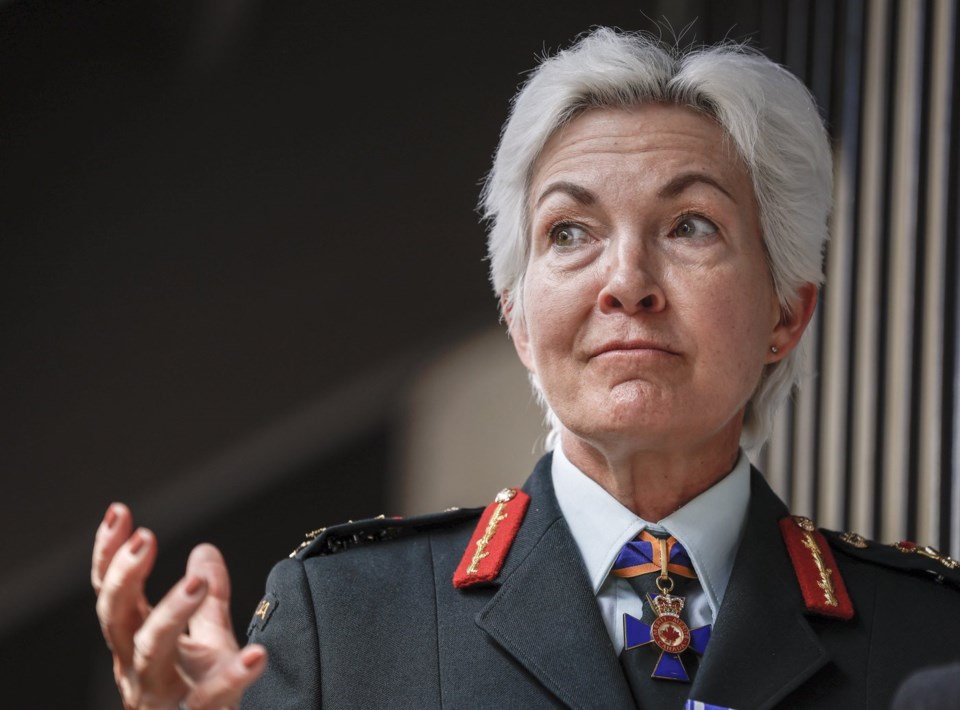OTTAWA — The head of Canada's military spoke with other top soldiers across the NATO alliance Wednesday, as they seek options for upholding peace in Ukraine if a ceasefire comes into force.
Chief of the Defence Staff Gen. Jennie Carignan was among those who took part in a virtual discussion with her counterparts from 32 countries.
"We welcome the willingness of the U.S. to provide security guarantees to Ukraine, which are essential to a durable peace agreement and support broader efforts to provide support to Ukraine," wrote military spokesman Kened Sadiku.
U.S. President Donald Trump is trying to broker a deal between Russian President Vladimir Putin and Ukrainian President Volodymyr Zelenskyy, though analysts fear any deal that would reward Moscow for its 2014 and 2022 invasions.
Ukraine said it needs "security guarantees" from other countries that can ensure Russia won't mount another invasion, while Moscow has called for Ukraine to be barred from membership in groups like NATO or the European Union.
Trump has erroneously suggested Ukraine started the conflict, and has said the U.S. won't send troops into Ukraine but might provide air support to maintain peace.
Italian Admiral Giuseppe Cavo Dragone said the video call was a "candid discussion" with "tangible" unity. Russian Foreign Minister Sergey Lavrov chided the talks, and any efforts to work on security arrangements in Ukraine without Moscow’s involvement.
Wednesday's call follows discussions that Prime Minister Mark Carney had with leaders from NATO countries as well as Japan and Australia on how to support peace in Ukraine.
Those countries are part of the Coalition of the Willing, a group of countries which have offered to help fund or staff a peacekeeping force on Ukrainian territory.
Marcus Kolga, a senior fellow with the Macdonald-Laurier Institute, said Wednesday's NATO discussion likely surrounds how co-ordination would work if there is any ceasefire in Ukraine, such as how weapons that allies purchase from the U.S. arrive in Ukraine.
Kolga said it's "extremely unlikely that there is some sort of a peace agreement," but allies want to have plans for dispatching Western peacekeepers to ensure guarantees are upheld, including who participates and which countries might lead such a force.
Canada would most likely help with logistics in establishing a mission in Ukraine, Kolga said.
In theory, Canada could transfer some of the troops it has already deployed to Latvia, as part of a NATO mission to disincentivize Russia from invading that Baltic country, Kolga said.
"Shifting some of those troops to Ukraine, logistically probably wouldn't be that challenging, if it's just soldiers," he said.
"It will really be an international effort. It won't be one country, I don't think, providing too much more support than any others."
Bob Rae, Canada's ambassador to the United Nations, took note of deadly Russian airstrikes on Ukraine that took place overnight into Wednesday.
"Russia is still at war with Ukraine. We all need to do more to help Ukrainians fight back. It is strength on the ground and in the air that will lead to an end to the war," he wrote.
"We have to push back hard. The Russian leadership don’t want peace. They want Ukraine, and all of it. Ignoring that fact will be a fatal mistake."
— With files from The Associated Press
This report by The Canadian Press was first published Aug. 20, 2025.
Dylan Robertson, The Canadian Press



